|
Introduction
The late Francis Schaeffer once identified Jeremiah as the quintessential prophet for the postmodern age. "Jeremiah," he wrote, "provides us with an extended study of an era like our own, where men have turned away from God, and society has become post-Christian" (Schaeffer: Death in the City). The rabbis called him the "Weeping Prophet," and not without reason. His entire mission was to herald sorrow, destruction, and hardship for the people of God... As he finally saw the Holy Temple burn to the ground, it surely must have seemed as if his entire ministry had failed...
The prophet Jeremiah (i.e., Yirmiyahu ha-navi: ūÖų┤ū©ų░ū×ų░ūÖųĖūöūĢų╝ ūöųĘūĀų╝ųĖūæų┤ūÖūÉ) is generally regarded as one of the three "major" Jewish prophets (the other two being Isaiah and Ezekiel). He lived from about 640-570 BC and began serving as God's prophet during the 13th year of King Josiah's reign. Jeremiah's long ministry would subsequently span the reigns of five different kings of Judah: Josiah (640ŌĆō609 BC), Jehoahaz (609 BC), Jehoiakim (609-598 BC), Jehoiachin (598-597 BC), and Zedekiah, the last king of Judah (597-586 BC).
Over the course of his 40 year ministry, Jeremiah saw the abrupt fall of the Assyrian Empire and the steady rise of Babylonian dominance in the Ancient Near East. He witnessed prince Nebuchadnezzar's rise to power and understood the significance of his military campaign against Egypt at the battle of Carchemish in 605 BC. He foresaw that the political future of Judah would turn on the conflict between Babylon and Egypt:
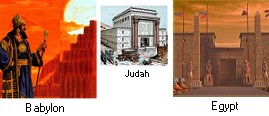 |
Jeremiah was living in Jerusalem when Nebuchadnezzar (who by then had become king of Babylon) returned to capture the city in 597 BC. At that time Nebuchadnezzar deposed the Jewish king Jehoiachin and installed Zedekiah (ū”ų┤ūōų░ū¦ų┤ūÖų╝ųĖūö) as his vassal (2 Kings 24:12,17). During Zedekiah's rule, Jeremiah advised the leadership of Judah to submit to Babylonian rule and not to look to Egypt as a political ally (Jer. 2:18,36; 37:7-8; etc.). Judah needed to accept the fact that its destruction was imminent and inevitable (Jer. 5:15-17). Because of his doom-laden prophecies, Jeremiah was regarded as a fatalist and a defeatist. The leaders of Judah rejected his message and regarded him as a traitor. His religious critics (i.e., the Levites and Temple administration) regarded him as a false prophet who did not believe in the doctrine of Zion's invincibility (Jer. 7:4). In particular, Jeremiah took issue with those who believed that the Temple functioned as some sort of "good luck charm" to ward off the threat of destruction from Judah.
"Do not trust in these deceptive words: 'This is the temple of the LORD, the temple of the LORD, the Temple of the LORD.' For if you truly amend your ways and your deeds, if you truly execute justice one with another, if you do not oppress the sojourner, the fatherless, or the widow, or shed innocent blood in this place, and if you do not go after other gods to your own harm, then I will let you dwell in this place, in the land that I gave of old to your fathers forever. But you trust in deceptive words to no avail" (Jer. 7:5-8).
Do not trust in these deceptive words: "This is the temple of the LORD,
the temple of the LORD, the temple of the LORD." - Jer. 7:4
Jeremiah went on to condemn the "lip service" exemplified by the corrupted Temple and its public worship services: "Will you steal, murder, commit adultery, swear falsely, make offerings to Baal, and go after other gods that you have not known, and then come and stand before me in this house, which is called by my Name, and say, 'We are delivered!' - only to go on doing all these abominations? I will do to the house that is called by my Name, and in which you trust, and to the place that I gave to you and to your fathers, as I did to Shiloh. And I will cast you out of my sight, as I cast out your kinsmen, the offspring of Ephraim" (Jer. 7:9-15).
Jeremiah's condemnation is clearly similar to that of Yeshua, who overthrew the moneychanger's tables, stopped the daily sacrifice, and charged the priestly leadership with making His Father's house a "den of robbers" (Jer. 7:11, Matt. 21:13, Mark 11:15-17; Luke 19:45-46). Like Jeremiah, Yeshua insisted that the "kingdom of God is within you," that is, a matter of the heart of faith. There is no inherent sanctity of a physical place apart from a heart that is trusting in the LORD's love and righteousness (Jer. 7:4-7; Luke 17:21). Indeed, Yeshua's harshest words were directed to religious leaders who made a pretense of their devotion to God, but were inwardly full of greed and self-deception:
"Woe to you, scribes and Pharisees, hypocrites! For you clean the outside of the cup and the plate, but inside they are full of greed and self-indulgence. You blind Pharisee! First clean the inside of the cup and the plate, that the outside also may be clean. Woe to you, scribes and Pharisees, hypocrites! For you are like whitewashed tombs, which outwardly appear beautiful, but within are full of dead people's bones and all uncleanness. So you also outwardly appear righteous to others, but within you are full of hypocrisy and lawlessness" (Matt. 23:25-28).
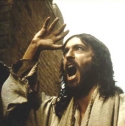
The "outer is not the inner," and vice versa. God abhors those who pretend to know Him but who are spiritual impostors (Matt. 7:21-23; 25:11-12; Luke 6:46). Because of such rampant hypocrisy, both Jeremiah and Yeshua denounced the Temple as utterly corrupt and foretold its destruction (Jer. 25:9,11; Matt. 24:1-2).
Yeshua warned us about the "leaven" (i.e., doctrine - ╬┤╬╣╬┤╬▒ŽćßĮĄ) of the Pharisees, Sadducees, and politicians of his day (Matt. 16:6-12; Mark 8:15). In Luke's Gospel, this leaven is defined as hypocrisy (ßĮæŽĆßĮ╣╬║Žü╬╣Žā╬╣Žé): "Beware of the leaven of the Pharisees, which is hypocrisy" (Luke 12:1). But what is hypocrisy? The word might come from the Greek prefix ßĮæŽĆßĮĖ (under) combined with the verb ╬║ŽüßĮĘ╬ĮŽē (to judge), and hence refers to the inability to come to a decision and exercise genuine conviction. It is a state of being "double minded," duplicitous, and insincere... Later the word connoted playing a part, "putting on a show," feigning righteousness, acting with insincerity, reusing "canned answers" or repeating the party line. Hypocrisy is therefore a form of self-deception. It is institutionalized prejudice dressed up as religion; it is counterfeit thinking that cheats the truth; it is ethnocentric nonsense that despises others as unworthy, inferior, etc. The "leaven of the Pharisees" is like old sourdough added to the community -- it "puffs people up" and is therefore based on human pride. The message of both Jeremiah and Yeshua was marked by repentance, humility, and the sincere desire to love and serve God.
The prophet Jeremiah clearly foreshadowed the prophetic ministry of Yeshua our Messiah. Both Jeremiah and Yeshua were called to deliver the judgment of God upon sinful man. Both lived in a time of political upheaval and unrest for Judah. In a sense, both were "prophets of doom" who became "enemies of the Jewish state." Both condemned hypocrisy and foretold disaster unless the people turned away from sin and turned to God with all their hearts (Matt. 15:8; Jer. 7:9-15). Both were "weeping prophets" who lamented over the City of Jerusalem (Jer. 9:1; Luke 19:41). Both were misunderstood and persecuted by the people of their day. Both prophets were plotted against by the citizens of their own hometowns (Jer. 11:21; Luke 4:28-30), and both were rejected by the religious and political leaders of their day (Jer. 20:1-2; John 18:13, 24). Both rejected the Temple worship as corrupt and beyond repair. Both condemned the "religious" reinterpretation of the Torah (Jer. 8:8; Matt. 23:2-3;23; Mark 7:5). Both were forcibly taken into Egypt because of political persecution (Matt. 2:13; Jer. 44). Both were falsely accused, arrested, and unjustly beaten (Jer. 37:12-15; Matt. 26:61; 27:26). Both were rejected by the secular Jewish king of the Jews (Jer. 32:2-4; Luke 23:8-11). And yet both never abandoned the Jewish people and ultimately offered God's comfort and hope (Lam. 3:22-25, John 14:1,27). Jeremiah and Yeshua both preached the New Covenant (ūæų╝ų░ū©ų┤ūÖū¬ ūŚų▓ūōųĖū®ūüųĖūö) of God that would transform a heart of stone into a heart of flesh (Jer. 31:31-34; Luke 22:20; Heb. 8:6-13; 9:15, etc.). Both foresaw that the true Temple of God was made without hands, built from material of hearts of those who truly serve God in Spirit and in truth... The destruction of the First Temple was the central catastrophe of the older covenant, just as the destruction of the Second Temple was the central catastrophe of the New Covenant. Because of the suffering and sacrificial death of Yeshua, the inner veil of the Temple has forever been rent asunder, and access to the Presence of God has been made available to all who trust in Him....
Because of his radical prophecies of doom, king Zedekiah eventually arrested Jeremiah and put him in the palace prison. Later Jeremiah witnessed the destruction of the city in fulfillment of his prophecies (Jer. 32:2-5; 38:28).

Like other prophets of the LORD, Jeremiah decried the false teachers and injustices of his day. "No one relents of his evil saying, 'What have I done?' Everyone turns to his own course, like a horse rushing for battle" (Jer. 8:6). And though he was of priestly lineage himself, he regarded the Temple in Jerusalem to be as corrupt as the Northern Kingdom's shrine at Shiloh (Jer. 7:4-15). He rejected the priest's narrow interpretation of the law as entirely deceitful (Jer. 8:8). Indeed, the entire culture was based on greed and deception, "from prophet to priest," everyone dealt falsely. "They have healed the wound of my people lightly, saying, 'Peace, peace,' when there is no peace" (ū®ūüųĖū£ūĢų╣ūØ ū®ūüųĖū£ūĢų╣ūØ ūĢų░ūÉųĄūÖū¤ ū®ūüųĖū£ūĢų╣ūØ). This lead to Jeremiah's apocalyptic warning of the coming destruction of Jerusalem and the exile of the Jewish people (Jer. 25:9,11).
Around 590 BC, Zedekiah and the Jewish leadership of Judah openly rebelled against Babylon (2 Kings 24:18-20). This act of defiance prompted Nebuchadnezzar to besiege Jerusalem in 588 BC (on the 10th of Tevet; 2 Kings 25:1). After the two-year siege, Jerusalem ran out of food, and the walls were breached (on the 17th of Tammuz). Zedekiah's family was killed, and the king was blinded, bound, and sent to Babylon (2 Kings 25:7). The Temple, the palace, and all of the houses of Jerusalem were destroyed (on the 9th of Av), and the remaining treasures from the Temple were taken to Babylon (2 Kings 25:8-17). The majority of the Jews were displaced to Babylon and "only the poorest people of the land" remained. Nebuchadnezzar installed a man named Gedaliah to function as his governor (2 Kings 25:22). Zedekiah proved to be Judah's last king...
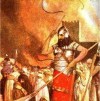
Jeremiah did not go with the Jews into exile, however, but was released from Zedekiah's prison to function as a liaison under a Gedaliah (Jer. 39:13-14; 40:6). He urged the Jews who remained in the land to submit to Babylonian rule and not to rebel (Jer. 27:11; 38:17). Despite his warnings, however, Gedaliah was murdered by Ishmael the son of Netaniah (who apparently regarded himself as a Davidic heir to the throne) and his gang of ten zealots (2 Kings 25:25). After Gedaliah's murder, the local Jews feared reprisal from Nebuchadnezzar and considered fleeing to Egypt to save themselves. Jeremiah warned them not to flee since the sword from which they were running would slay them there (Jer. 42:16-22). Unfortunately, the people disregarded Jeremiah's words and fled to Egypt anyway. Worse still, they abducted the prophet and took him with them (Jer. 43:2-7). A few years later Babylon conquered Egypt and tens of thousands of these Jewish refugees were killed (on the 3rd of Tishri). Jewish tradition says that Jeremiah was later stoned to death in Egypt for denouncing the idolatry of the surviving Jews who had fled there (Jer. 44).
Jeremiah's prophecies (as compiled by his faithful scribe, Baruch) were later collected into the "Book of Jeremiah" which is part of the Jewish canon of Scripture. The material in the book is thought to cover 30 years, though not in chronological order. Jeremiah is also credited as the author of the acrostic poem found in the scroll of Eichah (i.e., the "Book of Lamentations"). In Jewish tradition, Jeremiah is not regarded to be as great as Isaiah: "All the harsh prophecies which Jeremiah would prophecy against Israel, Isaiah preceded and provided the healing" (Eichah Rabati 1:23).
Midrashim about Jeremiah
Jeremiah was born in the small town of Anatot, about 3 miles northeast of Jerusalem. He is identified as a descendant of Rahab the harlot (ū©ųĖūŚųĖūæ ūöųĘū¢ų╝ūĢų╣ūĀųĖūö) by her marriage with Joshua, the successor of Moses (Sifre, Num. 78). His father Hilkiah was a Temple priest. According to midrash, he was prophetically born on Tishah B'Av to foreshadow his ministry of doom (Jer. 20:14). According to legend, it was evident that Jeremiah was destined for greatness from birth, since he born circumcised (Avot d'Rabbi Nosson). "Before I formed you in the womb I knew you, and before you were born I consecrated you; I appointed you a prophet to the nations" (Jer. 1:5). Jeremiah is said to have emerged from his mother's womb with a "great cry," which was said to foreshadow his lament for the destruction of Jerusalem. As a very young boy Jeremiah is said to have looked intently at his mother and said: "Mother, Mother, you did not conceive me in the way of women, and your path was that of the wayward woman. You set your eyes on another man and strayed from your husband. Why do you not drink the bitter waters of the sotah? You have been brazen-faced." When his mother asked, "Why do you speak to me this way?" Jeremiah replied, "I am not speaking about you, Mother; I am prophesying about Zion and Jerusalem" (Pesikta Rabbasi). Later God commanded Jeremiah not to marry and have a family because the coming judgment on Judah would sweep away the next generation (Jer. 16:1-4). Jeremiah often expressed his anguish of spirit which lent itself to his designation as the "weeping prophet" (Jer. 4:19; 9:1; 10:19-20; 23:9, etc.)
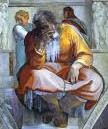
The sages sometimes compare Moses and Jeremiah. "Everything that is written about Moses is written about Jeremiah. As Moses was a prophet for forty years, so was Jeremiah; as Moses prophesied concerning Judah and Benjamin, so did Jeremiah; as Moses' own tribe (the Levites under Korach) rose up against him, so did Jeremiah's tribe revolt against him (Jeremiah was a kohen); Moses was cast into the water, Jeremiah into a watery pit; as Moses was saved by a female slave (the slave of Pharaoh's daughter), so Jeremiah was rescued by a male slave (Jer. 38:7-13); Moses reprimanded the people in discourses, so did Jeremiah (Pesikta d'Rav Kahana). We may add that Jeremiah expressed the same reluctance as Moses to become a prophet and offered the same kind of excuses (God gave Aaron to be Moses' mouthpiece but directly put words into Jeremiah's mouth (Exod. 4:14-16, Jer. 1:8-9). Some scholars have said that Jeremiah might have even regarded himself as the coming prophet whom Moses foretold (Deut. 18:18).
As a young man, the LORD appeared to him and said, "Listen closely, Jeremiah. While you were still in your mother's womb, I sanctified you to be a prophet for My people. The time has now come for you to go forth and prophecy." Deeply moved and afraid of this responsibility, he replied: "Master of the universe, how can You send me to rebuke the Jews? They will kill me! They even threatened to kill Moses and Aaron, who led them from Egypt, and they mocked Elijah and Elisha. Who am I to deliver your message to them? I am young - only a child. Who will listen to me?" (Jer. 1:6). The LORD reassured Jeremiah: "Be not afraid. You shall indeed go wherever I send you. I have chosen you precisely because you are so young and innocent. Go to them and pour out my wrath upon them (Jer. 1:7-10).
Jeremiah was dismayed that he must be the "prophet of doom." "He said, 'Master of the Universe, what sins have I done that in the days of all the prophets who preceded me and those who will follow me, you did not destroy Your House, but only through me?' The LORD answered, 'Even before I created the world, you were prepared for this mission'" (Pesikta Rabati 27:5). Nonetheless, Jeremiah begged the LORD not to send him: "The day on which I was born was an evil one (Jer. 20:14); May this day never be blessed (Tishah B'Av)" He continued to protest. "Consider the differences between Moses and me. In his time, the Jews were told, 'May the LORD bless you (Num. 6:24),' but I must bring them a curse (Jer. 29:22). In Moses' day, You promised to protect your people and give them peace (Num. 6:26), but I must bring them news of evil days which will come to pass, days of darkness and death, of war and great tragedy (Jer. 16:5). Woe is me to be destined for such a bitter task! I am like a priest who discovers in the course of punishing the unfaithful woman that she is none other than my own mother! So I am consigned to deliver the news of exile and destruction to my people, who are as dear to me as my own mother!"
Jeremiah tried to make the people repent from their detestable Molech worship, the "king of fire" (the word "molech" is thought to be a corruption of the Hebrew word for king, melech: ū×ųČū£ųČūÜų░, with the vowels of word "shame," boshet: ūæų╝ūĢų╣ū®ūüųČū¬, added). This gigantic statue apparently had an ox's head, a hollow belly, and outstretched arms. It was said to have stood within a Canaanite temple that had seven chambers.
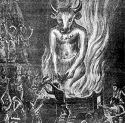
According to the Yalkut Shimoni (an collection of midrashim), a person who brought the "god" a gift of flour was allowed into the first chamber; a person who brought a gift of doves could enter the second chamber. A sheep gave access to the third, a ram to the fourth, a calf to the fifth, and a bull to the sixth. But if a true worshipper brought his infant son for sacrifice, he would be granted access to the seventh "grand" chamber of the Ammonite temple. The priests of Molech would heat up the belly of the idol and then burn the child to death in the idol's outstretched arms. Their frenetic drumming and shouts to the idol drowned out the screams of the baby. God sent prophets to warn the people to turn away from this horrible sin, which "had never entered His mind" (Jer. 32:35; Lev. 18:21; Deut. 18:10; 2 Kings 16:3; 17:17; 21:6; 23:10; 2 Chron. 33:6), but the people refused to repent. Nonetheless, God heard the cries of the babies and decreed that in punishment for these atrocities the Holy Temple itself would be sent up in flames....
When he saw the Jews so crazed with the fires of their idolatry, Jeremiah asked them, "Why do you pursue idols? What attracts you to such emptiness? The Jews replied, "We have forsaken the LORD and He is angry with us. That is why we seek comfort in our idols..." (Jer. 8:14). This midrash reveals the profound connection between our faith in God's love for us and our tendency toward sin. Despair over oneself can lead to shame, and shame leads to shameful actions (Prov. 13:5; 23:7). A person who abandons hope in the LORD and His love becomes a prey to the devil himself. If he no longer believes God can give him comfort, he will turn to the grossest forms of immorality to assuage his sense of abandonment.
According to Devarim Rabbah, "The Holy One, blessed be He, sent Jeremiah to the people when they sinned and said to them, 'Go tell my sons to repent.' The people said to Jeremiah, 'Should we return to the Holy One, blessed be He, with these faces? [i.e., we are ashamed to show our faces to Him].' The Holy One, blessed be He, sent Jeremiah again to tell them, 'My sons, if you return, is it not to your Father in heaven that you are returning? For He has never rejected you... By your lives, I will not deny my relationship with you. ' Nonetheless, despite such appeals, the people mocked Jeremiah and clung to their shame. It was the shame of sin that led to the destruction of the Temple in Jerusalem, just as it was the shame of sin that led to the death of the exiles in Egypt....
Note: This is presently unfinished... If God wills, I will add more later. Shalom for now...
|







